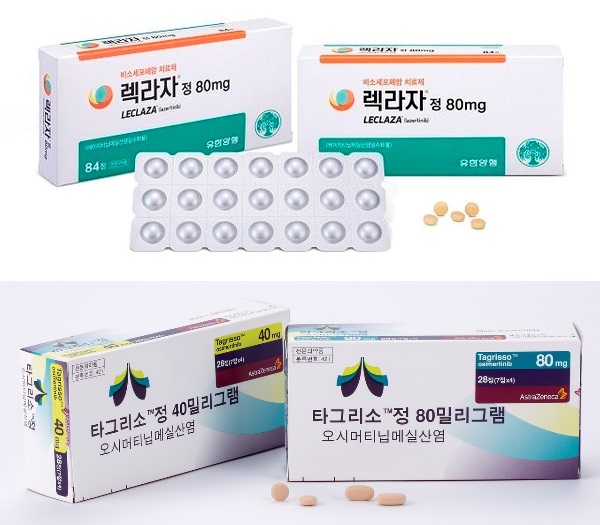The price of Yuhan's third-generation epidermal growth factor receptor (EGFR) tyrosine kinase inhibitor (TKI) for treating non-small cell lung cancer (NSCLC), Leclaza (ingredient: lazertinib), will be slightly lower than AstraZeneca's Tagrisso.

According to industry insiders, Yuhan has completed its drug price negotiation for Leclaza with the National Health Insurance Service (NHIS) on Monday and has set a drug price of 69,000 won ($61.80) per 80mg tablet. Considering that the drug has a recommended daily dose of 240 mg, patients will have to pay about 207,000 won a day.
The price is about 10,000 won lower than its competitor. The recommended daily dose of 80mg of Tagrisso is about 217,782 won per tablet.
Leclaza is a latecomer, but industry insiders stressed that the NHIS ended negotiations at a relatively generous price, considering that Leclaza is a locally developed drug with the possibility of expanding indications.
Accordingly, the reimbursement schemes for the two third-generation EGFR-mutated NSCLC drugs approved in Korea are sharply mixed.
The reimbursement for Leclaza is progressing at an unprecedented pace. Leclaza successfully passed the Cancer Disease Review Committee of the Health Insurance Review and Assessment Service (HIRA) and the Drug Benefit Evaluation Committee in April after receiving approval in Korea on Jan. 18.
If the regulatory body confirms the drug listing in July, it would have taken the company less than six months from approval to receiving reimbursement.
Contrary to Leclaza's rapid pace, reimbursement for Tagrisso as a first-line NSCLC treatment remains stagnant.
AstraZeneca has been trying to receive reimbursement after expanding the treatment as a first-line treatment for NSCLC in December 2018. In October 2019, however, HIRA concluded that it would withhold discussions until the company unveiled the full data from its phase 3 FLAURA clinical trial of Tagrisso.
However, a sub-analysis of all data from the FLAURA study failed to prove Tagrisso's overall survival benefit in Asians. As a result, HIRA raised a question about its clinical usefulness, refusing to provide reimbursement for the treatment in May last year.
To overcome this situation, AstraZeneca once again challenged to receive reimbursement by submitting additional data from the FLAURA China study, which showed consistent benefits with the entire cohort this year.
However, HIRA refused to provide reimbursement in April.
Leclaza is a second-line treatment for patients with EGFR T790M mutation-positive, locally advanced, or metastatic NSCLC who had received the EGFR-TKI treatment.
Based on phase 2 clinical trial results conducted in Korea, the Ministry of Food and Drug Safety has approved the treatment on the condition that it conducts a phase 3 clinical trial after marketing.

